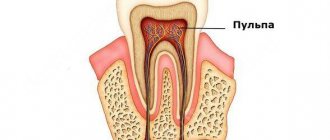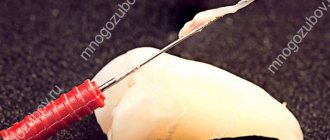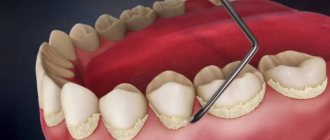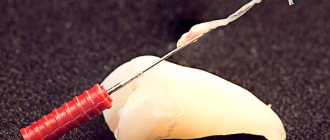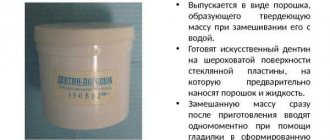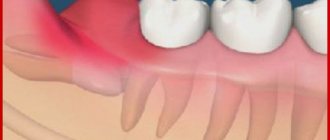Toothache is explained by the presence of a nerve - a process that connects the human nervous system with the dental crown.
If you have a pain syndrome, it is important to know how you can kill the nerve yourself at home using folk remedies (iodine, alcohol, vinegar, garlic, etc.), as well as how to quickly relieve pain at home with the help of medications, which will be discussed in detail Further.
What is a nerve and what is it for?
Human teeth consist of an outer bony part (crown) and numerous blood vessels inside.
Blood and lymphatic vessels, small fibers and a whole network of nerve endings are located inside - in the pulp, which is inaccessible to the human eye. Nerve fibers go far into the roots along the canal. This is the natural anatomical structure of the human tooth.
At human birth, the nerve is a catalyst for the process of growth and proper nutrition of the tooth. Afterwards, the function changes - the endings are an indicator of the ongoing destruction of the outer crown.
Modern pulp removal
Today, it is enough to go to the dentist once to remove the pulp. The doctor gives an anesthetic injection and calmly works with the tooth, removing the destroyed layer of dentin, extracting the pulp, treating and filling the canal. Sometimes inspection using a microscope is possible. To be on the safe side, your doctor may place a filling temporarily to make sure he has completely removed the pulp. And only if everything turns out to be in order, the final filling is installed.
Incomplete removal of the pulp is also possible, which makes sense if only the outer part of the pulp is affected by inflammation. Dead tissue is removed from the opened tooth, the outermost part of the pulp is removed, and the root remains intact. This is especially important on children's teeth, since the pulp is responsible for the formation of roots. When the pulp is not completely removed, the tooth is kept alive, and further destruction occurs more slowly.
How long does it take to die
Killing the nerve is called a devitalization procedure. This relieves periodic pain when eating cold, hot or sweet foods. The nerve dies from a day to several days or even months - it all depends on the method used for this. If a special remedy is used, then you won’t have to wait long - the well-known arsenic neutralizes nerve endings within 24 hours or even less.
If the decision was made not to touch the entire destroyed tooth, then you will have to endure periodic unbearable pain for several months - killing occurs due to developing dangerous bacteria. It is prohibited to resort to such a method, because it is fraught with the formation of a cyst due to the discarded “waste” into the gums and pulp.
This is important: Devitalization involves stopping the nutrition of the tooth, so after some time the crown will darken. The way out of the situation is treatment - the use of a filling will close the exposed roots and gums, and also prevent darkening of the bone part.
What to do after tooth depulpation
In the first few days, if pain occurs in pulpless teeth, you should use anti-inflammatory non-steroidal drugs:
- Ketanov. The effect of taking the drug is observed after 30 minutes, the effect of the medicine lasts for 5-6 hours. The product has many contraindications and side effects, so you should not get carried away with its use.
- Analgin. Can be used for toothache if it is not too intense. Relief from the condition after taking the medicine occurs quickly (within 15-20 minutes). Instead of Analgin, you can use Baralgin. It is able to relieve low-intensity aching pain in a tooth for a long time.
- Pentalgin. Used in cases where inflammatory complications after dental treatment are involved.
- Novalgin is an anesthetic with a pronounced anti-edematous effect. The effect of using the drug is observed within 15 minutes.
In what cases is it necessary to kill him?
The dental nerve is killed in most cases for painless treatment. Moreover, deformation of the pulp - drilling the tooth to apply a filling - will subsequently provoke partial “exposure” of the nerve endings. As a result, even after treatment the person will experience pain.
Among all the reasons for killing the dental nerve are:
- prosthetics;
- deep carious cavity - when caries has affected the deep layers of the pulp;
- previous poor-quality dental treatment – pain occurred after dental intervention;
- mechanical injury.
Prerequisites also include inflammation of the pulp, developing periodontitis and other destructive processes of the dental crown.
Precautionary measures
To prevent folk remedies for toothache from harming your health, you should follow several basic rules:
- do not swallow mouthwash;
- avoid contact of antiseptic solutions with eyes;
- do not keep medications in your mouth for too long;
- follow the dosage of medications indicated in the instructions.
The effectiveness of home remedies for pulpitis is questionable, since a person himself will not be able to clean and fill the dental canals. Among the complications that arise during treatment at home, the following should be noted:
- burn of mucous structures;
- inflammation of the soft tissues of the mouth;
- poisoning.
Symptoms
You can find out about the destruction of the pulp and the impact on the dental nerve by the existing unpleasant symptoms :
- prolonged pain - in most cases occurs after eating cold or hot, indicates inflammation of the pulp, tissue death;
- severe – acute pain can also cause the development of pulpitis, often indicating the formation of a crack in the dentin (the second layer of the tooth);
- aching - this type of pain indicates the beginning of destruction and partial exposure of the pulp;
- attacks - pain occurs only when pressure is applied to the tooth.
The formation of a characteristic unpleasant sensation when cold or hot is also noted. This occurs due to increased sensitivity of the tooth, which is the result of exposure of the nerve or root. Sometimes such symptoms indicate improper use of a toothbrush or the use of inappropriate toothpaste, which gradually leads to abrasion of the enamel.
What complications can there be from home methods?
Even a doctor during depulpation can make a mistake that will lead to undesirable consequences. What can we say about independent attempts to kill the pulp at home, without following any rules of asepsis and antiseptics. Among the possible negative consequences of such arrogance, experts note nerve separation, severe hemorrhage due to vascular injury, as well as the spread of inflammation to nearby tissues. Other possible problems include:
- allergic reaction to the substances used,
- injury to healthy tissues,
- burn of the mucous membrane,
- loss of taste sensitivity,
- infection and sepsis.
When using home methods, a burn may occur.
Most often, after trying to kill the pulp on their own using traditional methods, patients are faced with a severe burn of the mucous membrane. In other cases, the pulp is burned with preservation but serious damage to the nerve.
How dentists do it
For devitalization, it is better to contact dentists, who will conduct a thorough examination, determining the cause of the toothache. Specialists use special means to quickly kill the nerve and stop the patient’s suffering.
Arsenic pastes
Arsenic is the most common dental nerve killer used in dentistry. Previously, it was used in its “pure” form, mixed with suitable additives.
Today we offer ready-made formulations :
- Devit-ars - promotes rapid neutralization of the nerve, has an analgesic effect due to the content of lidocaine hydrochloride. The mixture is applied for a day, but with a special tooth structure, exposure is required for 2 days.
- Kaustinerv Rapid - the main component in the form of arsenic anhydride is contained in only one third of the presented composition. The rest is lidocaine, menthol, phenol and other additives. As a result, it is used to kill the nerve for 2-3 days.
- Septodont is a paste with a wide range of effects, actively used for the treatment of periodontitis. Has antibacterial and antifungal effects.
- Pulparsen - one third consists of the main substance arsenic, contains the antiseptic camphor.
- Causticin is also one third of arsenic anhydride, the rest is reserved for antiseptic and analgesic substances. Use to neutralize the dental nerve for at least 2 days.
Devit Ars Kaustinerv Septodont
Attention: The use of arsenic-based products must be carried out in strict compliance with the instructions and only with the permission of a doctor. Violation of recommendations may lead to irreversible consequences for human health.
Arsenic-free pastes
Such drugs include Devit-P and Devit-S . These agents are based on paraformaldehyde, lidocaine has an anesthetic effect, and creosote has an antimicrobial effect. Due to the fact that the drugs do not contain arsenic, their use takes place within 10 days.
Devit P Devit S
The advantage of the presented products is the absence of a substance dangerous to the human body and the need to clean the dental canal before treatment.
Process steps
Once the medication is applied to the exposed pulp, the process of neutralizing the dental nerve begins. Due to the influence of basic substances, cell respiration is impaired, resulting in decomposition of the constituent nerve branches.
Watch how a nerve is removed in dentistry:
When is nerve removal indicated?
If a person experiences severe pain that intensifies at night, and there is pulsation, then in this case depulpation cannot be avoided. But there are situations when there is no pain, but you still have to remove the nerve. Before answering the question of how to kill a dental nerve, let’s look at the reasons that lead to such a procedure:
- Pulpitis. These are the consequences of previously untreated caries, which gradually destroys the tooth and reaches the pulp, causing an inflammatory process. As a result, pain appears that requires radical measures: removal of the nerve and filling of the canals.
- Cyst or granuloma. They also contribute to the disruption of the sensitive area of the tooth and are removed only through the canals.
- Tooth injury. Any damage results in damage to the tooth enamel, which affects the nerve. If the frontal area is injured, then complete depulpation is performed. If the problem affects the back teeth, it is possible to partially remove the nerve.
- Prosthetics. If a person needs to get a bridge or crown, then the nerve must first be killed. This way you can reduce the risk of developing inflammation under the crown.
A specialist knows how to kill the dental nerve, so at the first symptoms it is better to seek qualified help.
How to kill with drugs
The use of the above products requires careful preparation, and then high-quality dental treatment.
The entire process of nerve removal includes the following steps:
- Opening the tooth - it is necessary to fully expose the pulp.
- Application of medication and temporary filling.
- Removing the applied composition, cleaning the canals, if necessary.
- Additional disinfection.
- Filling or other type of treatment.
- Control photo.
If you have severe pain, it is recommended to consult a dentist to identify the causes and develop appropriate treatment. Otherwise, you can only make the situation worse.
How to remove a nerve at home?
This method of treatment is considered prohibited, because a person can harm his health. Dentists recommend resorting to it only if other methods have not helped, you can’t get to a specialist, and the pain does not calm down.
Pulp removal at home must be carried out carefully, after first assessing the patient’s condition and determining whether there is periodontitis, an infection. If the gums are inflamed and the pain spreads to several teeth at once, then the procedure is dangerous. It's better to see a doctor.
Before removal, clean the cavity well, put in it homemade medicine or purchased at a pharmacy, which will kill the nerve.
Preparing for the procedure at home
Self-killing a nerve at home begins with preparation, which takes place in the following sequence :
Brushing your teeth – It is important to thoroughly clean your teeth, especially the one that will be treated. When brushing, all actions are smooth and without pressing with a toothbrush - this can provoke a new attack of pain.
Disinfection of available instruments - applying a paste or other product can be done in different ways using the most unexpected tools. All used items must be disinfected with alcohol or vodka.
Cleaning the hollow of a tooth - take a needle or thin wire and clean with careful and leisurely movements.
Rinsing the tooth with an antiseptic - after all procedures, the oral cavity is simply rinsed with a special antiseptic solution.
After the preparation has been completed, they begin to search for a tooth that has no prospects for treatment. To do this, touch each person with a cooled cotton ball, “listening” to the pain syndrome. If the pain is severe but short-lived, then the tooth should be treated by a dentist. If the pain goes away only after a few minutes, the tooth can be “finished off.”
What should you not do if you have severe tooth pain?
We have already described several ways to kill the dental nerve at home, but there are procedures that should never be done, otherwise the consequences will be disastrous:
- Warming up. Hot compresses will only worsen the symptoms.
- Rest in a lying position. In the lying position, blood circulation is activated, and blood flows faster to the teeth. As a result, the pressure increases and the pain syndrome intensifies.
- Using a needle. Do not penetrate into the hollow of the tooth with a sharp needle, as this can damage soft tissues and cause bleeding.
All these methods lead to serious and irreversible consequences, which will then take a long time to eliminate in the dental office.
How to kill an open dental nerve yourself at home
There are several ways to remove the nerve yourself, which is carried out after the preparation presented above.
Here you can use:
| Powder | A few grains are simply poured into the open channel. The method is dangerous to use because it entails corresponding intoxication. |
| Zinc | It is obtained from printing house ink by burning a small piece of newspaper. For the procedure, you need to use an anesthetic - drink Ketanov, apply Baralgin. Afterwards, a moistened cotton ball is dumped in the ashes of the burnt newspaper until it reaches a black color. Afterwards, you need to put it in the tooth and cover it with a clean one. |
| Alcohol | A cotton ball is soaked in alcohol and placed in the exposed tooth. You can prepare a solution - mix alcohol with water in a 1:1 ratio and rinse your mouth with it. This way you can relieve pain for a short time. |
| Vinegar | For killing, only 6% product is used. A ball of cotton wool is also soaked in it and placed in the tooth. You should be careful when using this method, since vinegar can cause burns to the mucous membranes. |
| Arsenic | Using this method is strictly prohibited at home. Here you need to use special medicines on arsenic bases. |
| Iodine | A cotton ball soaked in iodine is placed into the tooth and left for a day. |
Of all these methods, iodine is the safest. It is used carefully, monitoring the position of the cotton temporary filling - it is necessary to prevent the product from getting on the gums and mucous membranes.
The nerve has died - how to remove it at home?
You will not be able to remove the nerve yourself at home. It is better to consult a doctor who will use a special pulp extractor. Home removal can lead to disruption of the integrity of the nerve, which may cause the pain to recur.
Please note: Some people, having killed a nerve at home, try to remove it themselves using a regular needle. This method is theoretically correct, but in practice it always leads to complications.
Seeing a dentist even after self-killing a nerve is not a mistake; no punishment will follow for this. Only a specialist will assess the condition of the tooth.
Watch the video about why it is dangerous to kill a nerve at home:
Why does a tooth need a nerve?
The main function of nerve endings is sensory perception. With the rapid development of the pathological process, a pain reaction occurs, which signals tissue damage. Many people ask why there is a nerve in a tooth. In reality, it plays an important role and performs the following functions:
- Sensory. Signals the presence of development of an anomalous process.
- Nutritious. Provides nutrition to soft and hard tooth tissues.
- Immune. Plays an important protective role.
In addition, nerve endings play an important role in the mineralization of enamel and dentin. Why there are nerves in a tooth and what their role is, you can find out from our dentists at the Alpha Dent clinic. They are always ready to clearly demonstrate and tell everything so that the patient has a complete picture of why pain occurs and how to prevent the spread of the inflammatory process. Our clinic specialists are always ready to provide free advice and provide the necessary assistance.
The safest folk methods that will help calm the nerve and relieve pain
There are safer methods used at home to devitalize the dental nerve.
These include:
| Salt | This method involves using a saline solution to rinse your mouth. To prepare, mix a teaspoon of salt in a glass of warm water. This treatment will relieve pain in the inflamed nerve of the tooth for a short time. |
| Salt and garlic | A clove of garlic is ground into a paste and mixed with a small amount of salt. Next, the resulting mixture is placed into the open canal (hole in the tooth) until the pain syndrome is completely eliminated. |
| Comfrey flower | Make a root tincture - for this, 10 g of the main component is poured with 50 ml of alcohol and left for 10 days. A cotton ball is soaked in the tincture and placed in the tooth canal. |
| Propolis | Pour 30 g of propolis into 200 ml of alcohol and leave the mixture for 10 days. The finished tincture can be purchased at the pharmacy. Soak a cotton ball in the solution and place it in the tooth until the pain disappears. |
| Hydrogen peroxide | Use a 3% hydrogen solution, diluting it in water in a ratio of 2:1. A cotton swab is also soaked in the resulting liquid and applied to the exposed nerve. |
| Onion peel | It is used to prepare a decoction that can be used to rinse your mouth to get rid of pain. Pour about 30 g of husk into half a liter of boiling water and put on fire, bring to a boil, boil for 5 minutes. Then the broth is removed from the heat and kept for another 2 hours. Afterwards you can use it as directed, it will help calm the nerve and reduce pain. |
| Clove essential oil | Ready-made oil is purchased at a specialized store. A drop of the product should be placed on a cotton pad and applied to the sore tooth. |
| Lilac | An effective spring remedy. It is necessary to collect the leaves, chop them and pour half a liter of boiling water in the amount of 30 g. Then put on fire, bring to a boil, turn off the heat and leave for 2 hours. Simply rinse your mouth with the resulting decoction. |
| Wheat | If a toothache occurs, you need to drop the juice squeezed from the grains into the lesion. |
| Herbal infusions | Here you can use chamomile, lemon balm, cloves, sage, mint and oak bark for preparation. Rinse your mouth with the prepared infusions immediately when pain occurs. This recipe notes that it is better to use a warm infusion for processing. |
| Pepper | Pepper and salt mixed in equal quantities must be poured into the resulting hole. |
All the given recipes for killing the dental nerve are used immediately when pain occurs. Keep tampons and components in the canal until pain is completely eliminated.
The best treatment is prevention
Many patients are interested in whether it is possible to get a cold in their teeth if nothing bad has happened before under the same circumstances? It is possible if you have caries, but you did not cure it in time, and as a result, due to hypothermia, inflammation begins and the nerve hurts greatly. From this it becomes clear that it was caries that served as the root cause of subsequent inflammation, and if it had been cured, then a walk in the cold would not have brought any unpleasant surprises.
Pay closer attention to the health of your teeth, brush them thoroughly twice a day and do not forget to use dental floss and mouthwash. All these measures will help you avoid caries and visit the dentist less often, limiting yourself only to routine examinations.
It is important to take care of your health and choose the right clothes based on weather conditions. Severe hypothermia can cause serious illness.
Here are some simple tips to prevent colds in your teeth or facial nerve:
- Dress according to the weather; if it’s winter, don’t forget about warm clothes. Take care of gloves, a scarf and a warm hat, even if you leave the car for a short time. Sometimes a short stay in the cold wind is enough and a visit to the dentist becomes inevitable;
- Do not ignore even small manifestations of caries; a few unpleasant minutes in the dental chair are better than excruciating, incessant pain from a cold nerve. Do not skip preventive examinations with your doctor;
- A responsible attitude to oral hygiene can save you from many possible dental problems and save a lot of money on dental services;
- You can also get inflammation of the dental nerve in the summer when you are in a strong draft, near a working air conditioner or in a cold wind.
Do not forget that sometimes you need to have your teeth professionally cleaned to remove plaque and tartar, which can cause caries.
How to relieve pain with medications
If you do not want to deal with the above methods of tooth pain relief, you can use ready-made medications. All of them are intended only to eliminate pain; devitalization of the dental nerve does not occur in this case.
The most popular means include:
| Ketones | The most effective medicine for pain relief. Approved for use only by adults, it has a large number of contraindications. |
| Ketorol | An analogue of Ketanov with the same positive properties. It has many contraindications, which include diseases of the respiratory system, liver disorders, and stomach pathologies. |
| Took | Can relieve pain of moderate intensity. For people with increased hypersensitivity or during pregnancy, it is better not to take it. |
| Moment | Recommended for use to relieve inflammation and relieve pain. Dangerous for use during pregnancy and lactation; not recommended in the presence of ulcers or any pathologies of the circulatory system. |
| Solpadeine | Recommended for use when it is necessary to quickly relieve pain and inflammation. Do not use if you have problems with blood pressure. |
| It is based on valerian tincture and contains additional substances. Effective in the presence of mild pain. The drug is used to rinse a diseased tooth. | |
| Validol or Carvalol | They belong to the group of emergency drugs. A cotton ball is soaked in one of these products and applied to the diseased tooth. |
This is important: The products presented must be used in accordance with the instructions from the manufacturers. It is important to exclude the presence of contraindications.
What is strictly forbidden to do
There are also several strict restrictions and prohibitions that must be observed to avoid unwanted consequences. Here are the main ones:
- you can’t heat the causal area - no hot compresses, which only intensify the pain and provoke the spread of inflammation,
- you should not take a horizontal position - this will increase blood flow to the painful area, which will make the unpleasant sensations even more intense,
- Under no circumstances should you use needles - some try to pick out the cavity themselves, but this is strictly prohibited. Otherwise, you can provoke severe bleeding and even infection.
In no case should you attach a heating pad to an inflamed nerve.
Killing and removing a nerve from a tooth, even in dentistry, is considered a serious procedure that requires the proper experience and dexterity from a specialist. Therefore, in case of inflammation of the pulp, the help of a qualified specialist – an endodontist – is required. This is not a case where you can do it on your own. Don't risk your health.
1According to information at the office. manufacturer's website: vladmiva.ru.
Popular questions
Toothache often contributes to panic in the patient, which is why the most common questions are asked:
- The pain does not go away, what should I do? First, you should calm down and use another recipe to eliminate pain. If nothing helps, no matter how many remedies you try, you need to see a dentist.
- Arsenic does not kill the nerve, why and what to do? There may be several reasons for this - improper use or poor quality of the drug. It is recommended to change the arsenic-based product and increase the duration of exposure. If arsenic was applied by a doctor, you must contact him again for consultation.
- How to kill a tooth root? The root of the tooth cannot be killed; it should only be removed. This is often resorted to when a bone part is completely destroyed or in case of inflammation.
- Can a nerve in a tooth die on its own? The nerve can die on its own, but this will take a long time. Often its sensitivity is dulled, but when exposed to an “aggressive” component, the pain resumes.
- Is it possible to kill the dental nerve with analgin? Analgin and other similar drugs only eliminate pain, but cannot kill the nerve completely. When the effect of the pill wears off, the tooth will begin to hurt again.
- How do you electrocute a nerve? This method was used several years ago. According to patients, the procedure is unpleasant and quite painful. A special device was applied to the exposed nerve, which sent a charge of current. Microcurrent exposure led to cell death and burning of nerve vessels. As a result, its sensitivity decreased, and the removal was painless.
There are many issues of interest to people who prefer to solve all their problems at home rather than visit villains in white coats. However, a full consultation can only be obtained by visiting a dentist.
Dentist about removing a nerve in a child’s tooth:
Practical recommendations after visiting the dentist
If depulpation is performed correctly, pain may be observed. The pain may persist for several days. In this case, you can use painkillers prescribed by your dentist. However, if the pain does not stop for a week or more, you should immediately consult a doctor.
In this article, we learned why there are nerve endings in teeth, what important function they perform, and how to act in case of severe pain. In addition, you can learn more about why nerves are needed in teeth on specialized medical web resources, where dentists describe and explain everything in detail.
Alpha Dent specialists provide high-quality dental services. The clinic uses advanced equipment and innovative drugs, which ensures impeccable quality of therapy. Dentists will be happy to tell you how the nerves are located in a person’s teeth and what treatment is needed to achieve the desired result.
